40 лет Санкт-Петербургской типологической школе - [35]
(6b) *Xorata bjaxa veče obrali lozjata i
people.the be.IMPF.3PL already pick.PF.APP.PL vines and pusti empty.PL
Lit. «The people had already picked the grapes and deserted».
(6c) Njakoi ot lozjata bjaxa veče obrani i pusti
some of vines.the were already pick.PF.PPP.PL and empty.PL
*(ot studentite)
*(by the students)
«Some vines were already stripped and deserted».
This analysis shows that the double interpretation which may be assigned to a construction depends on the discursive context. Let us compare the following utterances:
(7a) Kolata e sčup-en-a / poprav-en-a
cart.the is break.PF-PPP-SG.F repair.PF-PPP-SG.F
«The cart is broken/repaired».
(7b) Toj vidja kolata i razbra, če e
he saw cart.the and understand.PF.AOR that is
sčup-en-a
break.PF-PPP-SG.F (7c) Toj vidja kolata i razbra, če e
He saw cart.the and understand.PF.AOR that is
sčup-en-a i posle poprav-en-a
break.PF-PPP.SG.F and later repair.PF-PPP-SG.F
«He saw the cart and understood that it had been broken and later repaired».
From the preceding examples, it is clear that the aspectual properties of the participle can change according to the construction. Examples (7a) and (7b) are of the descriptive type and code the state of the entity. As in (6a), the participle behaves like an adjective, but of verbal nature, and which with the auxiliary constitutes a syntactic predicate. Thus, it seems difficult to speak of the «orientation» of a participle. On the other hand, (7c) belongs to the domain of passivisation, even though the agent is not specified: the participle is oriented toward the patient of the basic transitive verb. The comparison between examples (7b) et (7c) merits special attention as it shows how the adjunction of a coordinated participle (popravena «(is) repaired») leads to the transformation, as noted by Maslov [1988: 77], of the stative meaning of the completive če e sčupena that we identified in (5a) as «an actional passive perfect» («had been broken and repaired»). Thus, the auxiliary transforms the resultative participle into a verbal unit (a passive verb) which functions as a one-place predicate [Desclés & Guentcéva 1993: 91].
If this type of syntactic condition is not limited to Russian, as Maslov[19] affirmed, the data show that the interpretation of a given construction with — n/-t is always context dependant. This can be illustrated with two Russian examples borrowed from [Knjazev 1988:344]:
(8a) My dvaždyj prošli mimo levogo bašennogo kryla zamka….
Vpervyj raz okna byli zakry-t-y.
windows were close.PF-PPP-PL
«We passed twice by the left tower wing of the castle. The first time the windows were shut».
(8b) Rita noč'ju zatejala ssoru: trebovala zakryt' okno….
Takprepiralis' dolgo, i Rita, razumeetsja, vzjala verx:
okno bylo zakry-t-o.
window was close.PF-PPP-SG.NEUTER
«At night Rita began a quarrel insisting that the window should be shut. They carried on for a long time and it was Rita who had the upper hand: the window was shut».
According to Knjazev, in (8a) the construction okna byli zakryty «the windows were shut» is an objective resultative, whereas in (8b) the construction okno bylo zakryto «the window was shut» is an actional passive. In other words, the construction in (8a) has the meaning of a state and implies: a) on the semantic level, one participant only about which a contingent property is predicated through the past passive participle; b) on the syntactic level, the structure is of the predicative type where the predicate, even though it has the form of a past passive participle, has the status of an adjectival determiner. On the other hand, the construction in (8b) has the meaning of a resultative state having, on the semantic level, three characteristics [DesclSs & GuentcMva 1993: 91]: 1. it implies a preceding event and the existence of an agent (specified or not); 2. it determines a property of the patient; 3. the property is not necessarily contingent upon the implied preceding event. On the syntactic level, the auxiliary operates on the past passive participle, associated with an abstract passive predicate which includes the notion of an unspecified agent, in view of its transformation into a verbal unit [ibid].
The resultative state, which I have just defined, must not be confused with the resultant state. Indeed, in languages such as Bulgarian, where there is an overt expression of the perfect (9b) and of a periphrastic passive (9a), these two notions are clearly distinguished:
(9a) Otvori čekmedžeto i razbra: parite
open.PF.AOR drawer.the and understand.PF-AOR money.PL bjaxa otkradnati.
was steal.PF.PPP
«He opened the drawer and understood: the money had been stolen».
(9b) Otvori čekmedžeto i razbra: bjaxa
open.PF-AOR drawer.the and understand.PF.AOR were
otkradnali parite
steal.PF.APP.PL money.PL
«He opened the drawer and understood: someone had stolen the money».
Although these two forms may appear in the same context, each has its own meaning: (9a) denotes a resultative state as defined above; it permits therefore to draw attention to the patient and to the characteristic which is attributed to it by the passive predicate; if the verbal form is a reminder of the implied event, it is in order to signify that at its origin is an agent. On the contrary, (9b) is an overt expression of the perfect; it denotes a
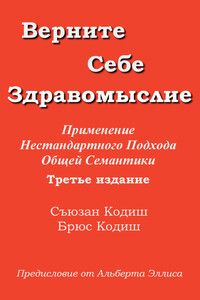
«Верните Себе Здравомыслие» – это книга, которая объясняет базовые положения общей семантики более простым, кратким и доступным языком в сравнении с 900-страничной формулировкой Альфреда Коржибски – Science and Sanity, а также даёт множество полезных и простых рекомендаций для практики и применения принципов Общей Семантики в повседневной жизни. Рекомендована к прочтению всем интересующимся данной дисциплиной, а также тем, кто желает приобрести новые навыки решения жизненных проблем. Третье издание.
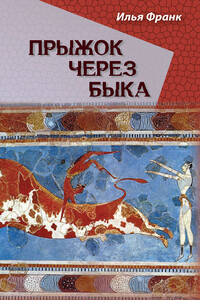
Почему, оказавшись между двух людей с одинаковыми именами, вы можете загадывать желание? На сей насущнейший вопрос и отвечает эта книга. Если же серьезно, то она рассказывает о зверином двойнике героя – в искусстве вообще и в литературе в частности.
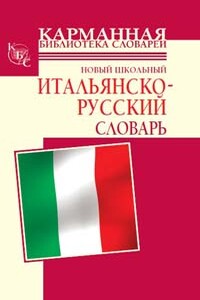
Словарь, созданный русскими и итальянскими специалистами, знакомит читателей с новыми словами, их различными значениями и оттенками, а также случаями употребления, которые можно активно использовать в повседневной жизни.Более 1000 слов и текстовых примеров, позволяющих раскрыть особенности синтаксиса современного итальянского языка.

В книге изучается феномен непрямого выражения смысла в языке. Сопоставляются различные толкования этого явления в русском символизме, феноменологии, лингвистике, семантике, аналитической философии, структурализме, теориях референции, тропологии, нарратологии, деконструктивизме и др. Выявляются и анализируются разнообразные конкретные способы непрямого выражения смысла: расщепленная, отсроченная, непрямая референция; двуголосие, полифония, антиномические конструкции; расшатывание акта именования, символ и метафора; ингенциональные и аттенциональные сцепления, модальные и тональные сдвиги; смещения и наслоения фокусов внимания, расщепление «я» говорящего на частные «голоса», их попеременные смены, чередования и наложения; саморедукция авторского голоса и ее степени, стадия инсценированной «смерти автора» и т.
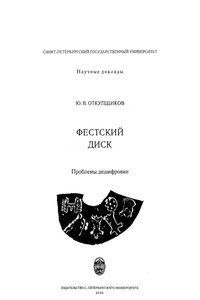
Данная публикация посвящена трудному и запутанному вопросу по дешифровке таинственного памятника древней письменности — глиняного диска, покрытого с обеих сторон надписью из штампованных фигурок, расположенных по спирали. Диск был найден в 1908 г. на Крите при раскопках на месте древнего Феста. Было предпринято большое количество «чтений» этого памятника, но ни одно из них до сих пор не принято в науке, хотя литература по этому вопросу необозрима.Для специалистов по истории древнего мира, по дешифровке древних письменностей и для всех интересующихся проблемами дешифровки памятников письменности.
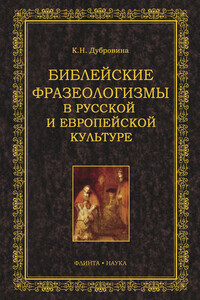
Книга представляет собой научный труд в популярном, доступном изложении. В ней рассказывается о библейских фразеологизмах (образных выражениях, пословицах, поговорках, афоризмах, крылатых изречениях) и библеизмах – словах в русском и других европейских языках, а также об отражении библейских образов, сюжетов, идей, правовых и морально – этических норм и воззрений древнего Востока в культуре народов, исповедующих христианскую религию. Особое внимание уделяется русской национальной культуре: использованию библейских слов и выражений в русском языке, в художественной и публицистической литературе, в изобразительном и музыкальном искусстве.Для гуманитариев разных специализаций: филологов, историков, культурологов, искусствоведов, школьных учителей, преподающих основы христианской (православной) культуры, а также для самого широкого круга читателей, интересующихся историей русского языка и культурой русского и европейских народов.Книга создана на кафедре общего и русского языкознания филологического факультета Российского университета дружбы народов (РУДН) при поддержке Российского государственного научного фонда (РГНФ).